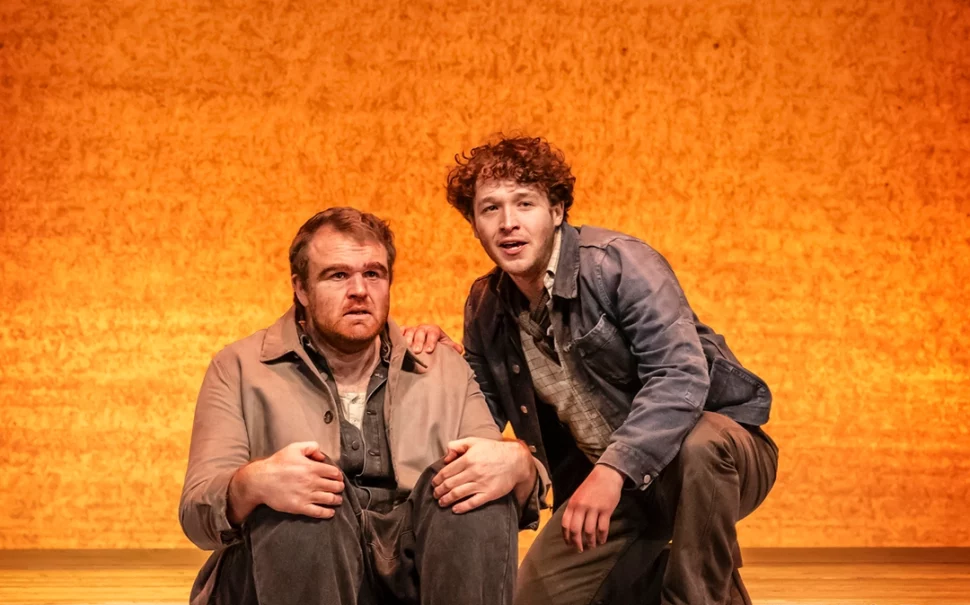It seems unfortunate to say it, but John Steinbeck’s classic novella Of Mice and Men is just as relevant today as it was when it was first written. This excellent new staging from director Sarah Brigham follows odd-couple George (Liam King) and Lennie (William Young) as they wander depression-era California in search of work. The backdrop may have changed, but the obstacles our characters face – prejudice, pettiness, bosses – are the same as ever. So too do the character’s dreams seem comprehensible to us – those of independence and self-determination. No less alluring now than they were when the novel was first published in 1937, at times too they feel no less elusive.
Unlike the themes, however, the world these characters inhabit is far from evergreen. Consisting primarily of wooden planking evoking a saloon-bar, Jess Curtis’ set design is powerfully spare. There is no world for these characters outside that of sandy tenements and dirty bunkhouses, it seems to say – the stage then becomes an effective every-bunkhouse for our every-man heroes.
Only in the final scene does the wooden backboard pull back to reveal a dusty red canvas sky. So distinct a contrast is it with the preceding claustrophobia that the effect is almost startling – or ominous. We are no longer in the human-made world of dwellings and ranches, but an older, almost biblical world of open plains and shrivelled watering holes. The decision to open up the space in this way lends the denouement a grandeur utterly appropriate to the action.
To breathe new life into old roles – roles at times dangerously close to stereotype – Brigham’s production takes the radical step of using actors with real, lived experience of their characters’ disabilities. Lennie is portrayed by William Young (Luke Richards in the matinee), who’s experience with learning difficulties brings nuance to a performance that in other hands could easily have fallen into caricature. A sensitive portrayal of a deeply sensitive man.

But if Lennie is the play’s heart, George is the head. In terms of lines and presence, George dominates much of the action, so it is fortunate that Liam King’s performance is so excellent. He is in turn caring and cruel, defensive and defeatist, morose and merry – one second frustratedly lashing out at his partner and the next second sinking into a bout of doleful, guilt-ridden apologetics.
His performance is also vibrantly physical. When he’s feeling comradely, he’s crouching down next to Lennie, speaking to him up close, a calming hand on his shoulder; when he’s mad, he’s pacing up and down the bunkhouse, gesticulating wildly with his hands; when he’s sad he’s slow and slouchy, doubled over, with barely enough energy left to lift his head. A large role demands a large performance, without which the whole show runs the risk of falling flat – thankfully, this is exactly what King has managed to do.
Outside of the lead duo, the cast is uniformly very good. Jeff Alexander performs well as Crooks, the prickly stableman who finds in Lennie an unlikely escape from an otherwise ever-present racism. Laurence Pears plays the cool, calm, and capable Slim, in a performance that absolutely radiates both kindness and self-possession.
Emma Charlton is also affectingly vulnerable as Curley’s wife. Just like her male counterparts, she is stuck inside a system over which she has no control, but gone is much of the meanness present in the book characterisation. Her background is also fleshed-out to a greater degree than book-readers may be expecting.
However, the variety is less welcome when it comes to the accents. Some of the main cast – such as King and Pears – are able to keep their drawls consistent throughout the performance, imbuing their characters with a sense of life. Other members of the cast are less even, with American accents that come and go as the emotional demands of their characters rise and fall. If you’re sensitive to this then this is not the show for you.
Despite these inconsistencies, the performances, set design, and attention to detail make this performance of Steinbeck’s much-loved classic well worth the asking price. Definitely recommended.
Main image courtesy of Bolton Octagon





Join the discussion